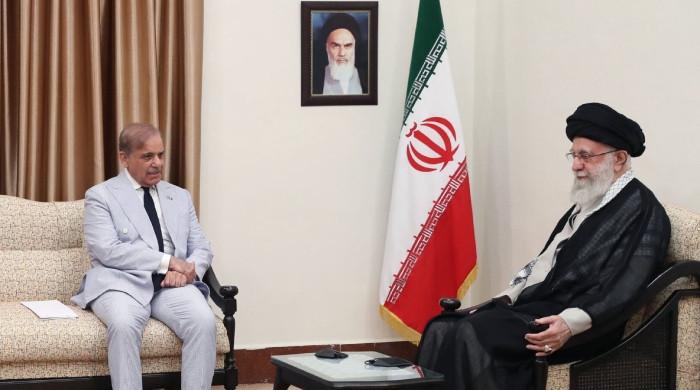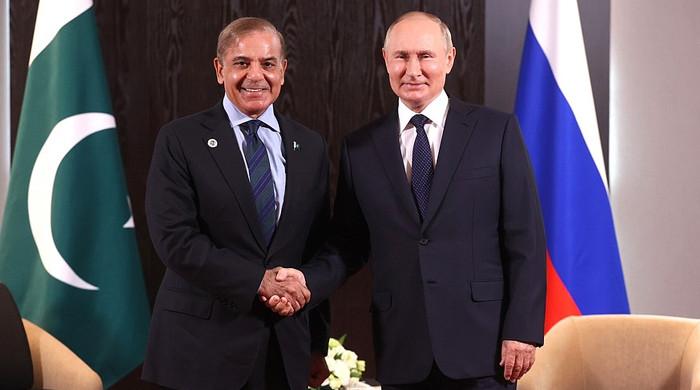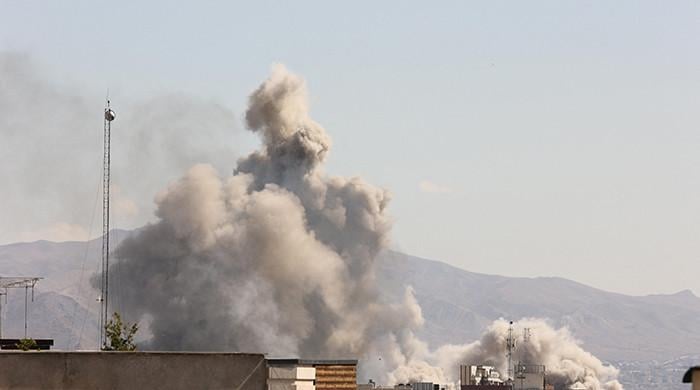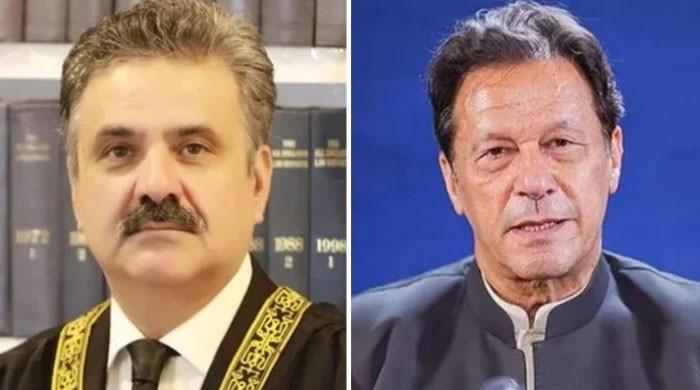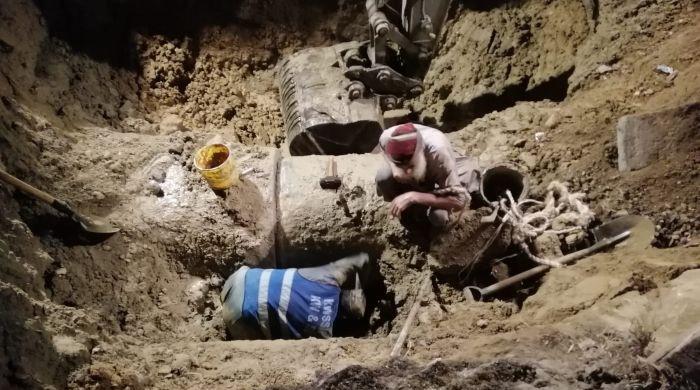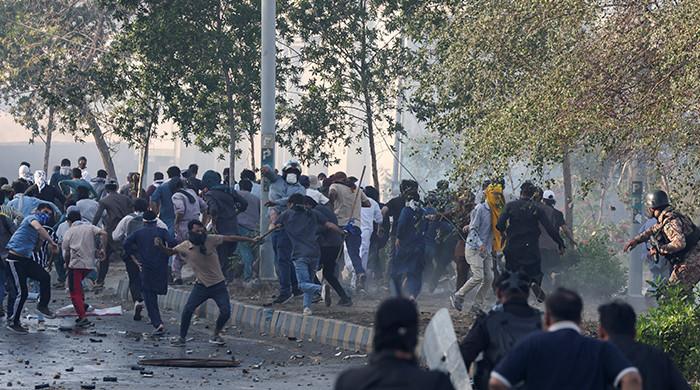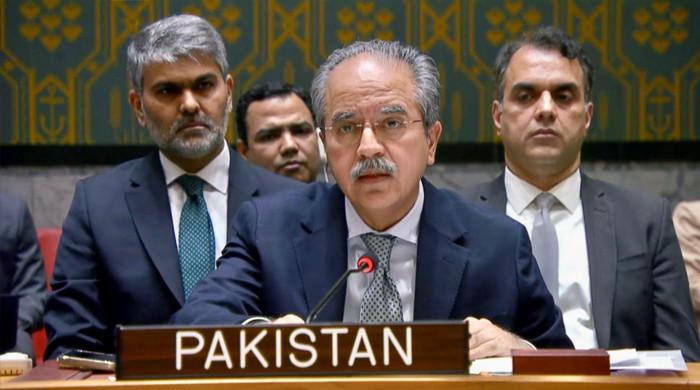Ensuring fair elections is ECP's constitutional duty, says Supreme Court
The ECP is not an ordinary government department, it has a mandate: SC admonishes chief election commissioner
February 16, 2021
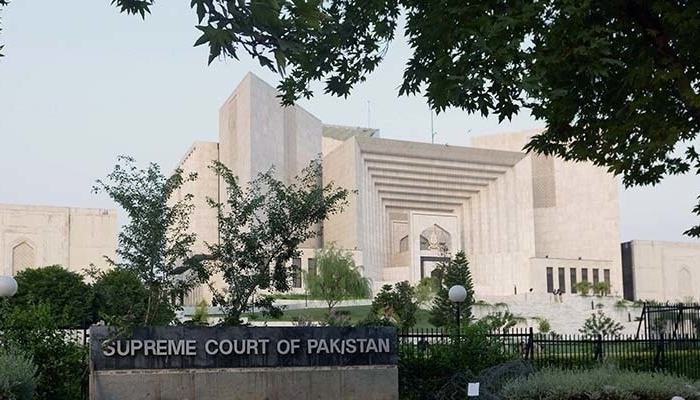
ISLAMABAD: The Supreme Court of Pakistan cross-questioned the chief election commissioner on Tuesday, telling him categorically that it is the Election Commission of Pakistan's (ECP) constitutional duty to ensure transparent Senate polls are held.
A five-member bench presided over by Chief Justice Gulzar Ahmed was hearing a case pertaining to a presidential reference regarding holding Senate elections through an open ballot.
The chief election commissioner and other heads of authorities were present in the courtroom for the hearing.
"The election commissioner should tell us how he plans to stop corrupt practices in the Senate elections," asked the chief justice.
Justice Ijaz ul Ahsan observed that the Election Act does not mention corrupt practices specifically. "The word 'guard' has been used for political interference before and after elections, as well as corrupt practices," noted the judge.
Justice Ahsan said that guarding against corrupt practices in this context would mean that precautionary measures ought to be taken before the elections so that they are held in a transparent manner.
"Money and political interference are used in elections," noted Justice Ahsan. "The election commission should tell us how it plans on stopping such practices."
The chief election commissioner responded by saying that the ECP does all it can under its jurisdiction to ensure that corrupt practices are thwarted. "Action is taken before and after elections, on grievances and complaints," said the election commissioner.
"Chief election commissioner sahab, you aren't understanding the depth of the problem," Justice Gulzar responded. "The ECP is not an ordinary government department, it has a mandate," urged the chief justice.
The chief election commissioner's counsel present inside the courtroom tried to speak but the bench cut him off. "We have summoned the chief election commissioner. Please keep quiet," the bench told the lawyer.
Explaining the measures taken by the ECP to curb corrupt practices, the chief election commissioner said that the commission had introduced a law for candidates directing them to open a bank account with a limit of Rs1.5mn for election-related expenses.
He explained that Senate elections are held via secret balloting as per Article 226.
"What is a secret ballot?" Justice Ahsan asked the election commissioner.
"A secret ballot is one which cannot be identified," he responded.
"From where have you assumed this definition of a secret ballot," asked Justice Ahsan.
The chief election commissioner responded by saying that there is a procedure highlighted in the Election Act. He said the election commission was aware of its responsibilities.
"The ECP cannot take action action against candidates for voting outside party lines," explained the chief election commissioner.
"Maybe you haven't tried to understand our order from the previous day," the chief justice responded.
"You don't seem to understand how elections take place in Pakistan. Making a code of conduct won't solve the issue," he added.
The chief election commissioner responded to the criticism saying that the ECP's monitoring and finance wing has been strengthened. The bench, however, did not seem pleased at the response.
"These are the job responsibilities of officers," said the chief justice. "What are you doing?"
"Chief election commissioner sahab, you are not informing us with a scheme to stop corrupt practices."
The election commissioner repeated that the votes that are polled in the National Assembly cannot be identified.
"Where is it written in the Constitution that after a vote is cast, it cannot be identified," asked Justice Ahsan.
"There is no provision in the Constitution for ballot papers that cannot be identified," the chief election commissioner responded.
Justice Yahya Afridi then asked the chief election commissioner whether the steps taken by the ECP are enough and whether they will stop corrupt practices from taking place.
Senate 'horse-trading' video
The chief election commissioner said that the ECP has taken notice of the Senate 'horse-trading video' from 2018 and had called a meeting to discuss it.
"The election commission got to know about a video from 2018 today?" asked Justice Ahsan.
"Did the ECP disqualify any senator? Were there not complaints relating to the buying and selling of votes after the last Senate elections?"
The election commission chief responded by saying that the electoral body took notice of corrupt practices in the Kurram by-election and had also taken notice over the presence of parliamentarians in an election rally that took place yesterday.
"You don't have to sit in your office and work from there only," the chief justice retorted.
The election commissioner responded by saying that the ECP will seek candidates' data from NAB and the FIA. "We will also seek candidates' documents from NADRA, State Bank of Pakistan and the FBR."
Coming back to the video, the election commissioner said that the ECP will decide whether or not a forensic audit of the video needs to be conducted.
"The video has been doing the rounds since 2018, yet no action has been taken yet," remarked the chief justice.
"Isn't the election commission trying to end corruption from the electoral process? Just look at what is being said about the [Senate] elections," the chief justice said.
The election commissioner then said that he would bring up the topic of open balloting under discussion.
ECP should take all stakeholders into confidence, says PPP's Raza Rabbani
The attorney general also gave his recommendations to the election commissioner on holding transparent polls. The chief justice urged the commissioner to review those recommendations.
"The attorney general is representing the government," objected the PPP's Raza Rabbani.
"The recommendations of a single party will not be acceptable for the rest. All stakeholders should be taken along," he said.
Rabbani said that there was no time for a constitutional amendment before the Senate elections, to which the chief justice said that that was not what the court was suggesting.
"Holding transparent elections is the ECP's job. All politicians talk of corruption in Senate elections," said the chief justice. "The election commission is aware of everything that happens."
Justice Ahsan explained that the apex court was tasking the election commission to stop corrupt practices under the existing laws, adding that the ECP had full authority to draft roles for the electoral process.
"We are not asking you to do away with secret balloting," said Justice Ahsan.
The hearing was subsequently put off till tomorrow.





